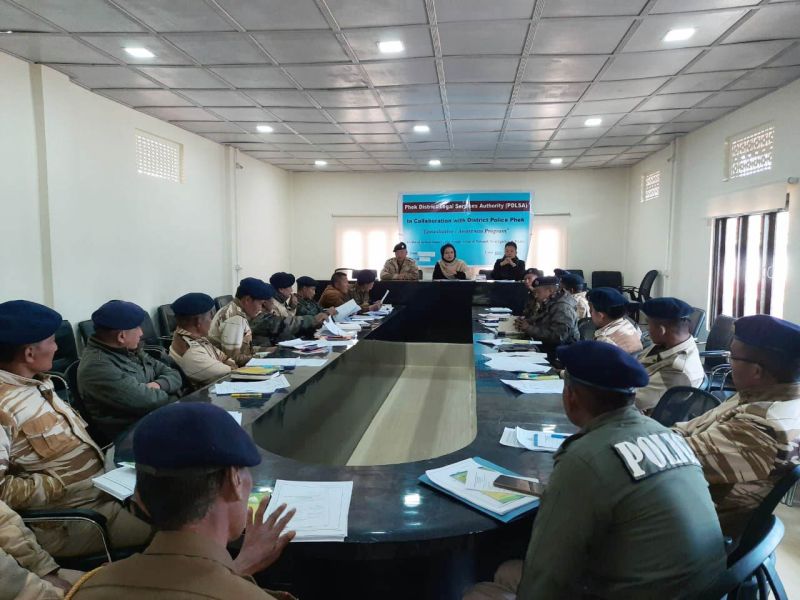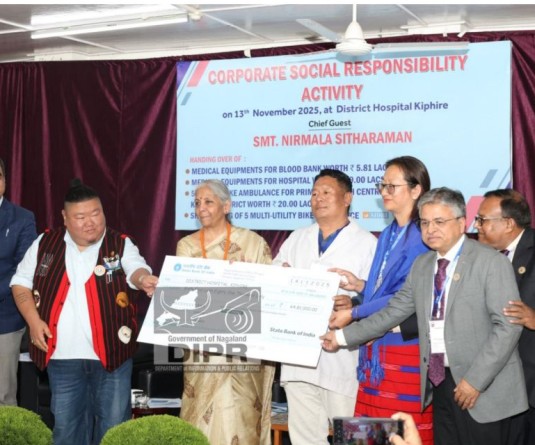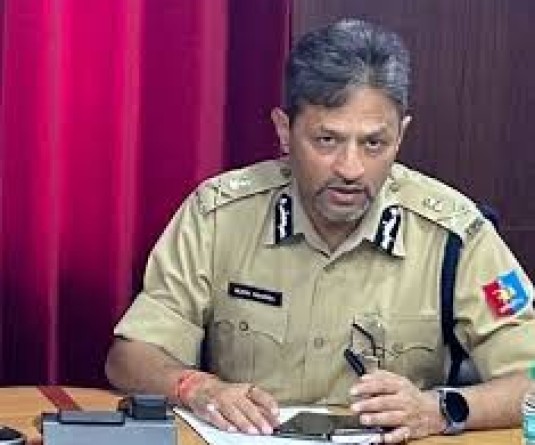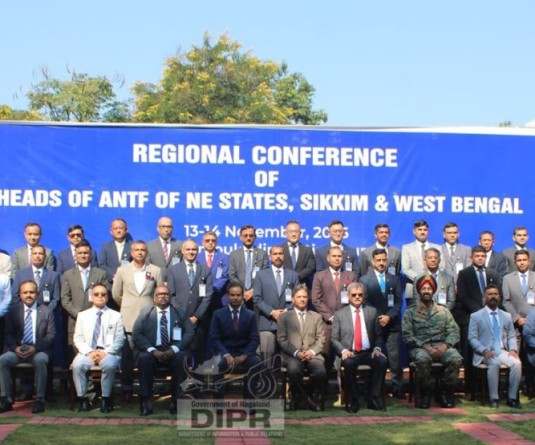Kohima Smart City creates awareness on Citizen Perception Survey

Phek DLSA in collaboration with district Police, Phek conducted consultative meet at DRDA Conference Hall, Phek. (Photo Courtesy: NSLSA)
Consultative meeting held with prosecutors and police on ‘Protocol for Early Access to Justice at Pre-Arrest, Arrest and Remand Stage’
Kohima, February 7 (MExN): District Legal Services Authorities (DLSAs) under the directive of the Nagaland State Legal Services Authority (NSLSA) conducted consultative meeting with prosecutors and police at the district level of Superintendent of Police, Sub Divisional Police Officer, Officer-in-Charge (Police Station), and Investigation Officer with regard to “Protocol for Early Access to Justice at Pre-Arrest, Arrest and Remand Stage”.
The consultative meeting, held during the last few days is being initiated following the National Legal Services Authority’s 31st Central Authority meeting resolution to implement a framework for providing legal assistance at pre-arrest, arrest and remand stage by all State Legal Services Authorities (SLSA), informed a press release issued by the NSLSA.
On this subject, the state authority has already taken the initiative of meeting Director General of Police to workout modalities for effective implementation of the framework and preparing quality hoardings enumerating rights and phone numbers and addresses of Legal Services Authorities which are to be distributed in all the police stations across the State; further District Legal Services Authorities holding consultative meeting with prosecutors and police.
Wokha DLSA: Wokha DLSA conducted the meeting on February 6. Wokha DLSA JMFC/Secretary Khrievono Seletsu spoke on the purpose of the consultation, its importance and explained the judgement of Arnesh Kumar Vrs State of Bihar and its importance at the stage of arrest. Adv Shanchobeni P Lotha, Project Assistant expounded the meaning of “Pre Arrest, Arrest and Remand stage” and relevant sections of Law which covers the rights of an accused at these stages. SP Wokha Imtitoshi Jamir (NPS) and Asst Public Prosecutor Renbemo Tungoe delivered short speeches.
Zunheboto DLSA: Zunheboto DLSA held the meeting on February 6 at SP conference Hall, Zunheboto. Wokono Yhoshü, Secretary, ZDLSA highlighted the purpose of the meeting. J Khetoholi Yepthomi, APP Zunheboto briefed on Juvenile Justice Act and Easter H Yepthomi Retainer lawyer highlighted the procedure on remand. The meeting was attended by 33 police prosecution under DEF Zunheboto.
Mokokchung DLSA: Mokokchung DLSA conducted the consultative meeting at ADC Panning Conference Hall. Keynote address was delivered by Duvelu Vero, Chairman MDLSA. Holika Sukhalu, Secretary MDLSA highlighted the agenda on the topic and explained the necessary steps to be taken. The meeting was attended by all the SDPOs, OC, IO from 6 police stations under Mokokchung District including Women cell, Traffic control and prosecution office. Altogether 40 person attended the meeting.
Dimapur DLSA: Dimapur DLSA conducted the meeting on February 5 wherein Principal District & Sessions Judge cum Chairperson Y Longkumer chaired the meeting and highlighted the purpose of the meeting. The police and the prosecution also expressed their views with regard to the pre-arrest bail and custodial interrogation in the presence of penal lawyers of Legal Services. Ajongba Imchen, Secretary DDLSA reminded the participants about Cr.PC, provision on arrest, remand, production. The meeting was attended by 36 officials from the prosecution and police department.
Peren DLSA: Peren DLSA held the meeting on February 7 at District Court Complex. Asungbe Retainer lawyer briefed on procedure on arrest and remand, followed by discussion hour. The meeting was attended by four OC and 9 police personals from different Police Station under Peren DEF and four Assistant Public Prosecutor, District Court, Peren.
Mon DLSA: Mon DLSA Secretary cum CJM Seyielenuo Mezhü, NJS pronounced the welcome remarks and agenda of the meeting. Rights of arrested person and corresponding duties of investigation officer was delivered was N. Mannon Project Assistant. There was discussion on expectation and challenges faced by police, advocates, prosecution while performing their duties and there was sharing of experiences. The meeting was attended by officer incharge and other police personnel, prosecutions and Advocates.
Longleng DLSA: Longleng DLSA held the meeting with Police officials on February 7. APP Anguto Sophie briefed that arrest should not be made mechanically. He spoke on section 41A CrPC, guidelines and condition provided by the Supreme Court in the case of Arnesh kumar vs State of Bihar which should be complied with before arresting a person.
He stated that the rights of accused should be protected by informing the accused ground of arrest and right to bail, right to have a Lawyer of his choice right to inform his friend, relatives or any other person about his arrest, right of medical examination and also that the accused should be produce before the nearest police station within 24 hours.
And at the stage of remand, accused should be represented by a Lawyer and if he has no means to engage a lawyer, then one should be provided to him from legal aid to assist in avoiding unnecessary arrest and also to decrease the vulnerability of the arrestees.
He further stated that to ensure fair trial it is important that access to justice is available at early stage of criminal proceedings.
Phek DLSA: The Phek DLSA in collaboration with district Police, Phek conducted Consultative meet/Awareness in a matter of Disclosure of Victim of sexual Assault/Pre-arrest, arrest & Remand, Investigation & Trials at DRDA Conference hall, Phek. Mezivolu T Therieh, NJS, District & Sessions Judge and Chairperson Phek DLSA, Phek spoke on Right to Free Legal Aid in pre-arrest, arrest & remand & Criminal Investigation and Trials. Altogether 23 Police officers, Officers in charge and investigating officers from all the six Police stations under Phek District registered for the programme.
Tuensang DLSA: Tuensang DLSA held Consultative Meeting with Tuensang DEF at Tuensang town on February 4. Kumdilong Kessen, JMFC cum Secretary spoke on Cognizance and non Cognizance, bail and non-bailable, warrant and summon. Soteth Anar spoke on Pre-arrest, arrest and remand stage. The programme was attended by SP Tuensang, SDPO Tuensang and officers from different sub-division police station. All together 28 police personnel attended the programme.
Kiphire DLSA: Kiphire DLSA held a consultative meeting with the police and prosecution at the police station, Kiphire. Welcome note was delivered by Rebica T Sangtam, Project Assistant. Amit Nigam, Superintendent of Police (IPS) Kiphire delivered a short speech in the meeting. He spoke on the value and importance of human rights basing on Article 39(A) of the Indian constitution which provides for availing free legal services to the people. Resource person Nokshei Kano, Secretary DLSA & CJM Kiphire spoke in detail in regard to arrest and pre arrest and also in respect of providing access to justice for the people. In his speech, he stressed on the procedures for arrest in cognizable and non- cognizable offences, about arrest of women and remand. Besides that, he also spoke on framing the quality chargesheet, medical aid to the accused persons and the convicts.
Mean while, Michael APP Kiphire also urged the members of the meeting to work hand in hand in order to provide access to justice to all the citizens in the district and also urged the DLSA Kiphire to work sincerely for the upliftment of the people. The programme was attend by 14 members representing the police, prosecution and the DLSA Kiphire and ended with a discussion hour with the members of the meeting.
‘Early access to justice is vital’
Right to free legal aid and assistance is an essential ingredient of reasonable fair and just procedure. It is implicit in the guarantee of Article 21. It is therefore, essential that access to justice is available at all stages of the criminal procedure. “Access to justice during early stages of the criminal process has its importance; ensuring among other things, protection of the rights of people when they are most vulnerable,” the NSLSA press release added.
Pre-arrest stage: The inclusion Section 41A to the CrPC has created a pre-arrest stage, thereby, necessitating the enforcement of the “right to legal aid even prior to arrest” when a suspect can be issued a notice of appearance to appear before the police for questioning. Most of the persons called for interrogation to the police station on suspicion of having committed a criminal offence are inherently vulnerable to factors such as- the environment of the police station and the uncertainty of what may happen to them. Providing of legal assistance to such persons can entail benefits of making the suspect feel less isolated or intimidated. Safeguarding his welfare and rights during interrogation, provide a check on police aggression and avoid unnecessary arrests.
Arrest Stage: The presence of a lawyer at the stage of arrest can make a huge difference to how the accused is treated in police custody. A lawyer at this stage can ensure that the police respect the rights of the accused and prevent unwarranted harms to the accused. It reduces the possibility of beating, torture, coercion for disclosures, wrongful detention, fabrication, false implication among others. A prompt legal assistance by lawyer at the time a person is arrested by the police may provide- assistance to understand why he has been arrested; Protection against intimidation; ill-treatment and; Assistance to understand and navigate the criminal justice process; Actualization of procedural rights; Ensuring bail in bailable offences at the police station itself.
Remand Stage: At the remand stage, efficient representation to unrepresented arrestees is quite imperative to ensure that unnecessary arrests are challenged, bail applications are filed, unnecessary remands are resisted and procedural rights are protected. Early access to justice framework is devised primarily with the objectives to provide legal assistance to needy suspects and arrestees during interrogation and other early stages or investigation; decrease the vulnerabilities of suspects and arrestees; to assist in avoiding unnecessary arrests; assist the arrestees in filing bail applications and famishing bail bonds.






